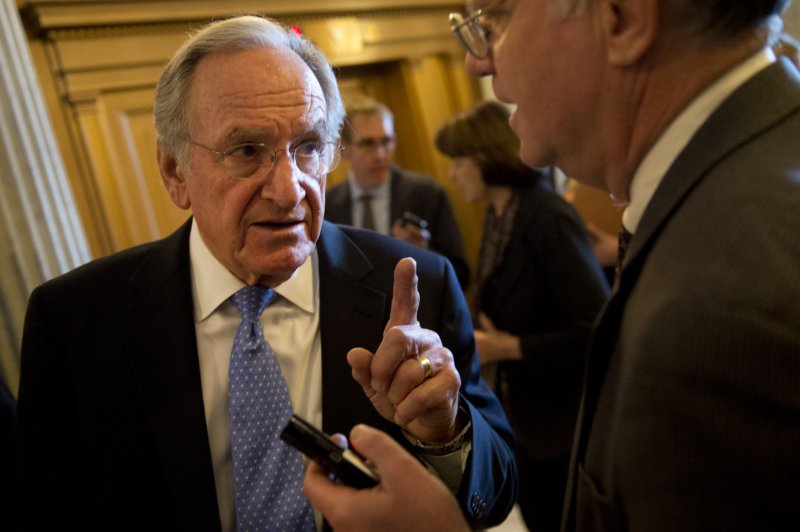Law to improve compounded drug safety passed Senate.
Sen. Tom Harkin (D-IA) talks to reporters as walks to the Senate Chambers for votes related to the budget. UPI/Kevin Dietsch |
License Photo
WASHINGTON, Nov. 20 (UPI) -- One year after more than 60 died and 750 were sickened by fungal meningitis, the U.S. Senate passed a law to help ensure compound drug safety, officials say.
The Drug Quality and Security Act reflects a bipartisan, bicameral effort to address drug safety and security issues and is aimed at helping prevent a future public health crisis such as last year's meningitis outbreak tied to the New England Compounding Center.
Sen. Tom Harkin, D-Iowa, chairman of the Senate Health, Education, Labor and Pensions Committee, said the bill cleared both houses of Congress and will go on to President Barack Obama to be signed into law.
"Just over one year ago, a widespread fungal meningitis outbreak brought attention to the legal and regulatory gaps that allowed owners and managers at the New England Compounding Center to disregard basic procedures to ensure that the products they were manufacturing were sterile. This gross negligence had heartbreaking consequences for families nationwide," Harkin said in a statement.
"And the contamination at the NECC was not an isolated incident: over the last decade, patients have suffered a range of grievous -- even fatal -- infections as a result of compounded drugs that were contaminated or improperly formulated."
This legislation will improve the safety of compounded drugs as well as establish an unprecedented tracing system that will, for the first time ever, track prescription drugs from manufacturing to distribution, thereby thwarting drug counterfeiters, Harkin said.
"Americans must have the confidence that their drugs -- whether obtained at a hospital, at a doctor's office, or at the pharmacy counter -- are safe, and that is exactly what this bill does," Harkin said.
The legislation:
-- Distinguishes compounders engaged in traditional pharmacy practice from those making large volumes of compounded drugs without individual prescriptions.
-- Says compounders who wish to practice outside the scope of traditional pharmacy practice can register as outsourcing facilities, but those who choose to remain traditional pharmacies will continue to be primarily regulated by State Boards of Pharmacy as they are in current law.
-- Defines the Food and Drug Administration's role in oversight of outsourcing facilities. Outsourcing facilities would be subject to FDA oversight in much the same way as traditional manufacturers. FDA will know who these outsourcers are and what they are making, receive adverse event reports about compounded drugs, and have the authority and resources to conduct risk-based inspections.
-- Will give providers and patients the option of purchasing products from outsourcing facilities that comply with FDA quality standards.
-- Offers providers and patients better information about compounded drugs.
"We have worked for a year to find a solution that would help prevent a repeat of the tragic meningitis outbreak that has killed 16 Tennesseans and made so many others so sick," said Sen. Lamar Alexander, R-Tenn., ranking committee member.
"Those Tennesseans deserve this bill, which will make it clear exactly who is in charge of overseeing each compounding facility, so there will be no questions about who's on the flagpole."
The House passed its bill in September.















